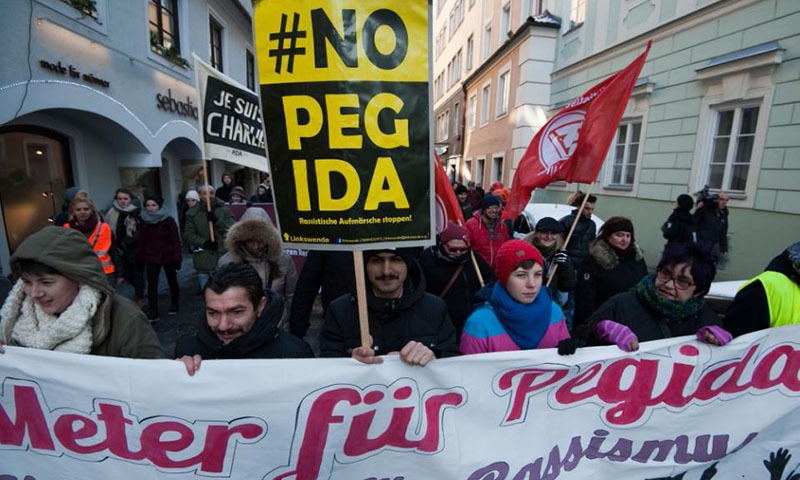For the last couple of months, weekly anti-Muslim demonstrations have been taking place in several German cities. Led by Pegida, the acronym for its German name of Patriotic Europeans Against the Islamisation of Europe, the protests began in Dresden and have spread to other cities.
These marches have attracted counter-protests that often outnumber the anti-Muslim demonstrators. Oddly, only 0.5 per cent of Dresden’s population is Muslim. And although a demo in Leipzig drew 25,000 marchers, the numbers have fallen since. One reason is that the leader of the movement, Lutz Bachmann, was revealed to be a closet neo-Nazi when a photograph of him with a Hitler moustache and haircut surfaced.
Even though many German Muslims are of Turkish origin who mostly speak German and are fairly well integrated, it is the new wave of asylum seekers from Syria who have caused alarm.
And while Europeans as a whole tend to be uncomfortable about the presence of Muslims living in their midst, they forget that countries like Lebanon, Jordan, Turkey and Pakistan are hosts to far larger numbers of refugees. In fact, one in four of those living in Lebanon today is a Syrian refugee.
Although these protests show signs of dying down, disquiet over the rising Muslim presence in Europe is growing. A few days ago, almost all British newspapers carried front-page stories to inform readers that the Muslim population in England and Wales had nearly doubled in ten years, rising from 1.55 million in 2001 to 2.71 million in 2011.
But more than its size, it is the composition of the population that is causing concern in Britain: 1 in 3 Muslims is under 15 years of age, compared with 1 in 5 overall; and 4pc of Muslims are over 65 compared with 16pc overall. These numbers translate into a relatively young cohort, many of whom will be reaching reproductive age soon. Given the generally larger size of Muslim families, many fear that the numbers will keep rising at a higher rate than the general population.
Although only one Briton in 20 is Muslim, the public perception is that the numbers are four times this figure. One reason for this skewed estimate is that the Muslims are a very visible minority who tend to congregate in urban areas. An increasing number of Muslim girls and women have taken to covering themselves either in headscarves or in full burqas or niqabs, while the men often sport long, easily identifiable beards.
And while other migrants generally dress like locals and blend in, Muslims tend to stay apart, with religious and cultural factors perpetuating this divide. Every few weeks, incidents to do with the sexual exploitation of young white girls, alleged terror plots, or the willingness of many young Muslims to join the Islamic State enhances the negative image many Brits have of Muslims and Islam.
If growing numbers of Britons, with all their tolerance, can feel this hostility, then things are far worse in much of Europe. In France, the recent Charlie Hebdo killings have boosted the right-wing, Islamophobic Front National’s poll ratings. As it is, widespread dissatisfaction with immigration policies has made the party a force to reckon with.
From Sweden to Netherland, anti-Muslim sentiments are rising, fed by images of horrors committed by organisations like Boko Haram, the Islamic State and the Taliban. Hardly have the images of one atrocity faded that another is headline news. This steady barrage of horror stories, combined with the perception that Muslims in Europe constitute a fifth column prone to join extremists groups and attack the host communities, has hardened attitudes. Now, even liberal politicians need to toughen their stance on immigration to address widely held public concerns.
One result of growing prejudice is to make it harder for young Muslims to get jobs. In France, Muslim unemployment goes up to over 40pc in some areas. In Britain, only 20pc are in full time employment, compared with 35pc overall. But then 18pc of Muslim women are at home, while only 6pc of British women fall in the category of full-time housewives. And while 24pc of all Muslims are educated to degree level, the figure is 44pc for Hindus.
Housing is another issue that divides the communities. Relatively few Muslims live in homes they own, with the majority in assisted housing. Some council estates are breeding grounds for crime, with gangs fighting each other in vicious turf wars. Racism is rife, and bullying common. In these conditions, many Muslim kids band together for protection; some of them are then radicalised in local mosques or online.
In countries across Europe, the link between poverty, unemployment, overcrowded ghettos and Islamic radicalism has been well established. But there are no easy answers. The reality is that nobody planned this influx or encouraged it. But laws regarding the right to asylum, and to bring in spouses, have opened the door to growing numbers of legal immigrants. And then of course there are illegal ways that involve people smugglers and dangerous routes.
In a 2013 poll conducted by the British Social Attitudes, 62pc of those surveyed said they were worried that an increasing Muslim population would weaken Britain’s national identity. In 2003, 48pc voiced a similar concern. And an online survey conducted by The Daily Telegraph suggests that 88pc of its readers are worried by the presence of large numbers of Muslims. However, the Telegraph is a right-wing newspaper, so many of its readers would tend to be anti-immigration.
Muslims in Europe are thus caught between a rock and a hard place. Their faith and their culture sets them apart from the host community. This isolates them and erects walls at a time when they should be building bridges.
Published in Dawn, February 16th, 2015
On a mobile phone? Get the Dawn Mobile App: Apple Store | Google Play














































